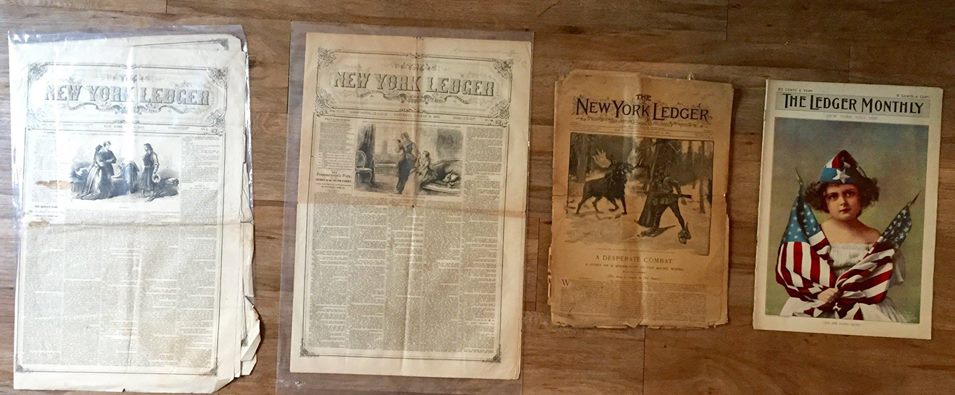Piatt, Sarah. “An Orphan’s Adjuration.” The New York Ledger [New York, NY] 21 May 1859: 7.
Three poems are published in this May issue of the Ledger: John Saxe’s “Death and Cupid: An Allegory,” William Ross Wallace’s “The Days of Old,” and Sarah Piatt’s “An Orphan’s Adjuration.” Because of my research interests in nineteenth-century women periodical poets, my eyes naturally turn to Piatt who would’ve been in her early twenties during the time of this publication.
Before marrying Ohio poet John James Piatt in 1861, Piatt published under the name “Sally M. Bryan” in the pages of the Louisville Journal and The New York Ledger. According to Paula Bernat Bennett, Piatt stopped publishing in the Ledger after 1861. Piatt's early poetry, including poems in the Ledger, have been referred to as “juvenilia” and receive little study, although some scholars are beginning to pay more critical attention to these works.
Known for her children’s poems, Piatt published a significant number of elegies and apostrophes about nineteenth-century children and motherhood. “An Orphan’s Adjuration” is a representative example of such poems.
“An Orphan’s Adjuration” is made up of four octaves. It is an internal monologue concerning the speaker’s thoughts on her dead brother, who is now in heaven, i.e., the spirit’s original “place of birth!” (1). The speaker asks her dead brother if the love that they shared on earth is “[l]ost in the boundless glory of the sky” (4). The brother’s place in heaven and the speaker’s inaccessibility to it raise a number of questions in the poem. The speaker claims that heaven and earth are different: in heaven the brother “’mid stars and seraphs thou does dwell, / [a]nd I—down in the dust where serpents hiss / [a]nd roses fade and sounds of sadness swell” (12-14). The incongruity between the speaker’s earthly existence and the dead brother’s heavenly dwelling drives the speaker to ask, “But art thou less my brother! for all this?” (15). In the closing stanza, the speaker wonders about her own death and refers to herself in the third-person, “And though that child’s red, parted lips have grown / [p]ale and half-scornful…her golden hair / [i]s darkened, as to suit the fate she’s known. / Thou lovest her the same!” (25-28). In this final meditation, the speaker asks, “wilt thou not re-clasp her in thy arms [in reference to herself] / [a]nd tell the hosts of Heaven, It is my child” (32). The orphan’s adjuration is revealed in this final line, as the speaker pleads to the dead brother to “tell the hosts of Heaven” to permit her, like her brother, into Heaven when her time comes.
Three poems are published in this May issue of the Ledger: John Saxe’s “Death and Cupid: An Allegory,” William Ross Wallace’s “The Days of Old,” and Sarah Piatt’s “An Orphan’s Adjuration.” Because of my research interests in nineteenth-century women periodical poets, my eyes naturally turn to Piatt who would’ve been in her early twenties during the time of this publication.
Before marrying Ohio poet John James Piatt in 1861, Piatt published under the name “Sally M. Bryan” in the pages of the Louisville Journal and The New York Ledger. According to Paula Bernat Bennett, Piatt stopped publishing in the Ledger after 1861. Piatt's early poetry, including poems in the Ledger, have been referred to as “juvenilia” and receive little study, although some scholars are beginning to pay more critical attention to these works.
Known for her children’s poems, Piatt published a significant number of elegies and apostrophes about nineteenth-century children and motherhood. “An Orphan’s Adjuration” is a representative example of such poems.
“An Orphan’s Adjuration” is made up of four octaves. It is an internal monologue concerning the speaker’s thoughts on her dead brother, who is now in heaven, i.e., the spirit’s original “place of birth!” (1). The speaker asks her dead brother if the love that they shared on earth is “[l]ost in the boundless glory of the sky” (4). The brother’s place in heaven and the speaker’s inaccessibility to it raise a number of questions in the poem. The speaker claims that heaven and earth are different: in heaven the brother “’mid stars and seraphs thou does dwell, / [a]nd I—down in the dust where serpents hiss / [a]nd roses fade and sounds of sadness swell” (12-14). The incongruity between the speaker’s earthly existence and the dead brother’s heavenly dwelling drives the speaker to ask, “But art thou less my brother! for all this?” (15). In the closing stanza, the speaker wonders about her own death and refers to herself in the third-person, “And though that child’s red, parted lips have grown / [p]ale and half-scornful…her golden hair / [i]s darkened, as to suit the fate she’s known. / Thou lovest her the same!” (25-28). In this final meditation, the speaker asks, “wilt thou not re-clasp her in thy arms [in reference to herself] / [a]nd tell the hosts of Heaven, It is my child” (32). The orphan’s adjuration is revealed in this final line, as the speaker pleads to the dead brother to “tell the hosts of Heaven” to permit her, like her brother, into Heaven when her time comes.


 RSS Feed
RSS Feed
